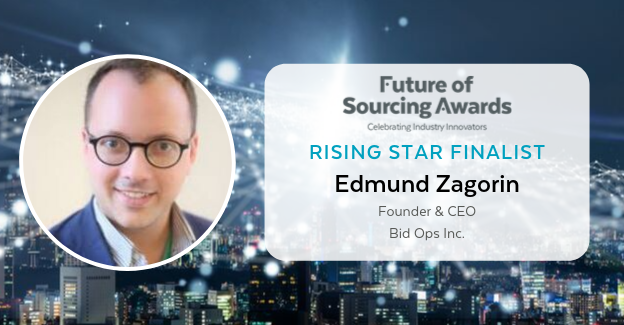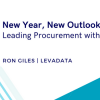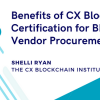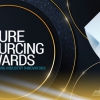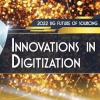This October, the Future of Sourcing Awards will celebrate individuals newer to the industry whose thought leadership and expertise have shown promise that is likely to have a lasting impact on the industry. Below, read about Rising Star Finalist Edmund Zagorin, the founder and CEO of Bid Ops Inc., the first company to apply artificial intelligence to vendor negotiations.
Rising Star Interview: Edmund Zagorin
My path into sourcing was very much by accident. The first sourcing projects I worked on were for independent films. Independent films are notoriously low-budget and chaotic, so it was always an adventure getting the right equipment and set of vendors for each commercial project. When I got into more traditional procurement management consulting later in my career, I focused on designing multi-phased sourcing processes to qualify vendors and evaluate their products and services for large enterprises. As dry a topic as it may sound, I found designing sourcing processes fascinating (especially for high-value negotiations) because it was an incredible opportunity for large organizations to truly leverage their buying power. Through these experiences, I began to think about leverage as expressed in business results, both in terms of savings and total enterprise value. This was the inspiration for founding Bid Ops: using AI to automate some of the low-value (but 100% necessary) tasks in these multi-phase sourcing processes and thereby democratize access to excellent sourcing processes and value-creating vendor relationships.
My hope is to influence the sourcing industry through Bid Ops by sharing access to hassle-free sourcing processes that can support better vendor negotiations and better vendor relationships.
If sourcing teams can decrease the friction and busywork associated with using excellent processes, they can really be heroes helping their organizations align spending habits with their organization’s overall mission and values. To me, using AI to create alignment between stakeholders, buyers and vendors is an immensely exciting opportunity.
When I first moved to Silicon Valley, Alec Wright, CIO at GSVLabs gave me some Bill Campbell-style coaching about how to listen and ask questions to prospective customers at the beginning of the technology development lifecycle that continues to play a huge role in Bid Ops’ growth today. Early investors Gab Draney, Whitney Sales and Rich Eggers were very generous in sharing their immensely valuable insights about the startup lifecycle for enterprise-focused technology businesses. Cindy Padnos of Illuminate VC, our venture investor and board member, is an inspirational fountainhead of energy and enthusiasm. As the founder/CEO of procurement technology startup Vivant, Cindy always takes time out of her day to share lessons from her successful operating experience. Neeraj Gupta of Cervin Ventures, our venture investor and board member, has been an awesome role model for truly digging into “why” behind the business requirements of a customer. Matt Ziskie, former CPO of Airbnb and Box and now a Bid Ops board member is a paragon of procurement excellence with a bias towards telling really amazing supply chain adventure stories. Brent Maas and Ken Desowitz each answered my cold phone call years ago for no good reason and offered their perspective about the future of public procurement, and the role that technology would play in that future. Chris Yin, an early employee and product executive at Coupa spent a lot of time advising me on product functionality and helping our founding team think through our own technology roadmap. Through a twist of fate, I had the pleasure earlier in my career of meeting and interviewing legendary Microsoft product manager Steve Sinofsky, whose remark about “capturing the ephemeral magic of conversation” left a lasting impact.
When people talk about “the market” as an abstraction, I often wonder if they truly know the utterly vital role that procurement and sourcing play in creating competitive opportunities for enterprises. Without the rigor of this vendor competition created by excellent sourcing processes, businesses will inevitably overpay for whatever the most talented, hardworking salespeople are selling (rather than what the business really needs or what solution creates the most authentic value). Simply because many vendors and solutions exist in “the market” does not mean that all businesses can benefit from market competition. In a world where so many technology cycles are sales-led, building a disciplined, value-focused sourcing organization can be a real competitive advantage (rather than solely a lever for cost-reduction). The market does not work by itself, and certainly not in every category. Rather, sourcing and procurement processes must create markets in which the most value-creating vendor and solution can be recognized and put into scalable practice.
Mass adoption of technology solutions (as well as economic consideration) will continue to put pressure on the procurement and sourcing industry to “do more with less.” Mass adoption will likely be driven by a mix of breakthrough technologies such as AI and blockchain alongside simple, user-friendly, best of breed digital platforms and apps that mirror developments in the consumer market, such as Amazon, Uber, Slack and Airbnb. As enterprise business applications become designed increasingly with the goal of delighting users, procurement leaders will begin to prefer cloud-based technologies with rapid deployments over traditional platforms that require a costly up-front ERP integration. Procurement technology will move from “end-to-end” solutions that claim to do everything to best of breed solutions that do one or two things really well. This unbundling of procurement technology will follow the same evolutionary trajectory of sales and marketing automation over the past decade, e.g. technology “stacks” including Salesforce and Hubspot for CRM, Marketo for campaign automation, LinkedIn for business networking and a host of other smaller applications for contact discovery and database management. Following this trajectory will mean the emergenc of a “procurement stack”, where different segments of the source-to-contract and procure-to-pay cycle are radically improved by modular digital apps.
Sourcing is more fun than most people realize. If you enjoy teamwork and executing complex communication maneuvers on a tight timeline, you may find yourself loving your job. If deadlines stress you out and you really hate telling people “no”, then perhaps it won’t feel like the best fit.
However, life outside of procurement is chock-full of stressful deadlines and people whose unsolicited expectations you’ll absolutely want to shatter. If strategic decision-making is an executive skill that you want to cultivate, then a career in procurement and sourcing can provide a fantastic learning curve.
Region:


